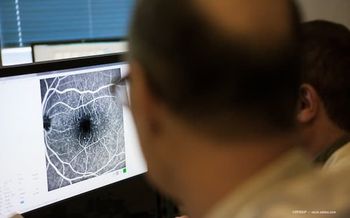
ASRS 2023: Deep learning models and the importance of training from imaging datasets
Aaron Lee, MD, shared how research and new techniques are expanding the options for deep learning in ophthalmology. He spoke with our team at the 2023 ASRS meeting in Seattle, Washington to share more about this research.
Aaron Lee, MD, shared how research and new techniques are expanding the options for deep learning in ophthalmology. His research hopes to bring new understanding to diagnostics and dieases progression monitoring. He spoke with our team at the 2023 ASRS meeting in Seattle, Washington to share more about this research.
Video Transcript
Editor's note - This transcript has been edited for clarity.
Aaron Lee, MD:
Okay, I'm Aaron Lee. I'm at the University of Washington. I'm an associate professor there. My research for the last couple of years has really been on the focus of artificial intelligence and big data, and trying to understand and uncover new associations in opthalmic diseases using these very powerful techniques. But the, one of the critical ingredients that has been really missing in our field has been the availability of large datasets, large imaging datasets, in particular, that you need to train these very large, deep learning models.
And so the presentation I'm giving is really about how to build the next future of large datasets that everybody can use to train deep learning models, in the field of ophthalmology. One of the things that's really important for this is the standardization of those images so that it's easy for researchers to use.
Traditionally, those images have always been sort of locked up in a way that it makes it very difficult for people to open, but actually Heidelberg, with the Heyex PACS system allowed for those images to be unlocked in a way where you can just literally copy them off the hard drive and open them in a third party viewer.
And because Heidelberg made this move, the whole industry now is moving in this direction. And it's really sort of transforming the landscape of the availability of this kind of data. So we're very, sort of excited, about the new future of data science in retina research in particular. And so that's really sort of the focus of my research and what we're doing for the next couple of years.
Newsletter
Keep your retina practice on the forefront—subscribe for expert analysis and emerging trends in retinal disease management.



























